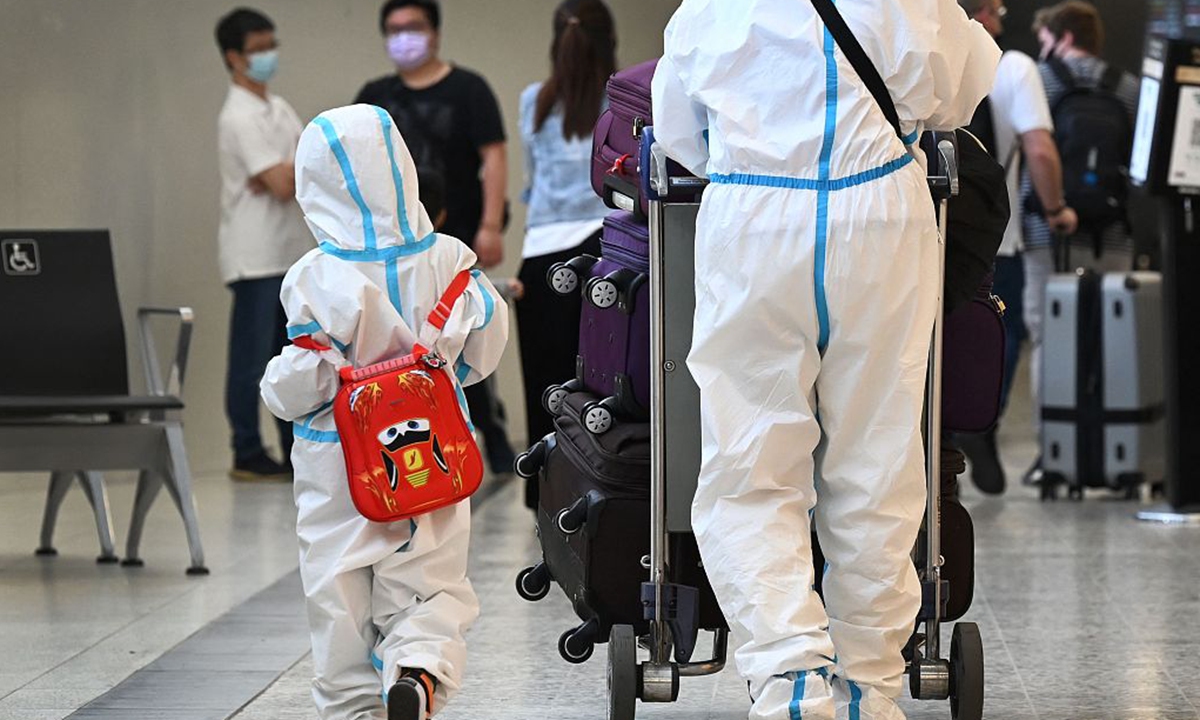
International travellers wearing personal protective equipment arrive at Melbourne's Tullamarine Airport on November 29, 2021. Photo: VCG
As the reopening plan for Australia's border has been postponed two weeks to December 15 with the arrival of the Omicron variant, the Chinese Embassy in Australia warned international students to be mindful of their wellbeing as health and safety risks in the country have increased significantly.
On Monday, the Australian government decided to pause the next step to reopen the country to international skilled and student cohorts, as well as humanitarian, working holiday maker and provisional family visa holders, from December 1 until 15.
International students who have been fully inoculated with Sinovac and Sinopharm vaccines, approved by Australian Therapeutic Goods Administration, can enter the country from December 15.
The Chinese embassy on Tuesday published an article warning Chinese international students to wear a medical face mask, keep social distance and avoid traveling on holiday in the country.
The embassy advised international students to rationally choose the time and flight route to Australia. Students can continue to take online courses and other forms of study according to the regulations of the university, the embassy announced.
Recently, more than 100 new cases have been reported every day in the state of New South Wales, while in Victoria, the daily count has reached over 1,000 new cases. Also, five cases of the Omicron variant of COVID-19 have been found in Australia, media reported on Monday.
Despite the continuous pandemic in the country, Australia still plans to reopen its border after vaccinating 86.8 percent of the eligible population. The Australian government boasted that "we have one of the highest vaccination rates in the world."
Chen Hong, professor and Director of the Australian Studies Centre at the East China Normal University, expressed his concern over the rushed border reopening plan citing Australian doctors who said that taking the vaccination rate as the sole criterion to ease the border restriction is not scientific.
"The vaccine is not the silver bullet to avoid infection despite the fact that the vaccination rate in Australia has increased," Chen told the Global Times on Tuesday.
Chen worried that the reopening of the border and the easing of the anti-pandemic restrictions in some Australian states would cause another wave of cases, especially with the arrival of the Omicron variant.
Chen pointed out that both the reopening of the border and the eased anti-pandemic measures in the country are driven by economic interests without considering the potential threat they may bring. Australian Prime Minister Scott Morrison is taking the policies as a bargaining chip to raise his profile for the next year's federal election which is not responsible, Chen criticized.
In addition, there have been hostile remarks and aggressive actions against Chinese students in Australia, the embassy warned. In case of verbal harassment or physical conflict, the embassy suggested students to gather evidence, protect their rights and interests through legal channels according to local laws and regulations, and call the police in case of emergency.
As telecom fraud against international students in Australia is flourishing, the embassy also warned the students to be cautious about their personal information when making a reservation, renting or looking for a job.
Since Canberra has poisoned China-Australia relations, the anti-China sentiment has grown misled by local media, Chen said, adding that the anti-Chinese feeling has become a serious issue in the country, warning Chinese students to make a rational decision when choosing Australia as overseas study destination.




